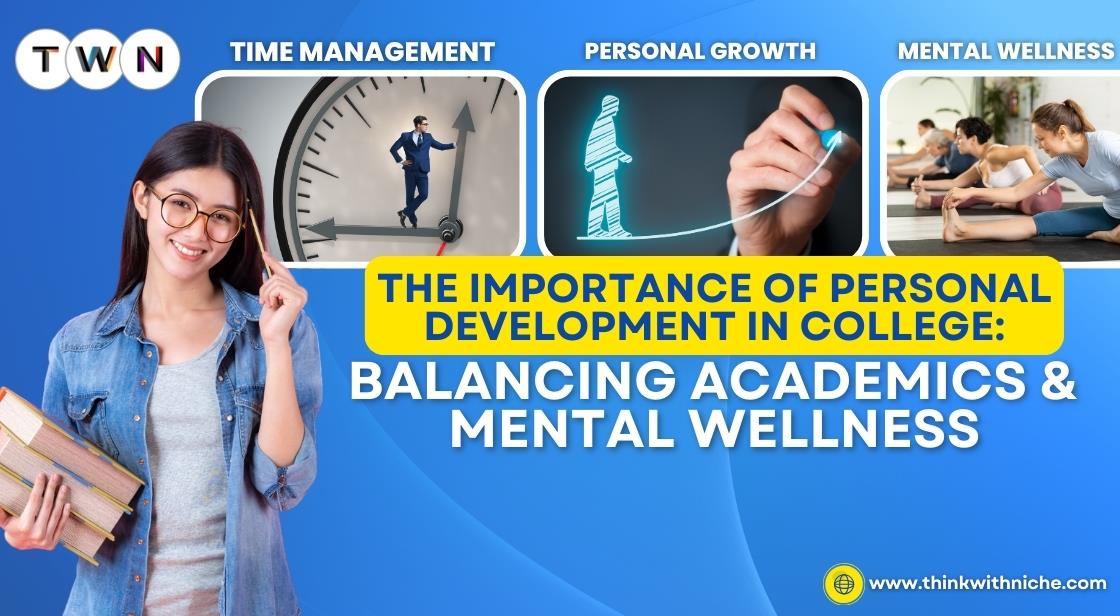The Importance of Personal Development in College: Balancing Academics and Mental Wellness

Blog Post
College is a transformative phase in life, offering students a unique opportunity to grow academically, personally, and emotionally. However, balancing academic demands with personal development can be challenging, often leading to stress and burnout if not managed properly.
Personal development during college is not just about achieving high grades; it involves fostering self-awareness, emotional intelligence, and resilience—qualities that are essential for both academic success and long-term happiness.
In this article, we explore how college students can strike a balance between academics and wellness, highlighting the importance of managing time, developing emotional intelligence, and prioritizing mental health.
By integrating personal growth with academic responsibilities, students can not only enhance their performance but also build a solid foundation for their future.
Learning to navigate the pressures of college life while focusing on wellness will not only improve the college experience but will also prepare students for the challenges and opportunities that lie ahead in their careers and personal lives.
Through thoughtful self-care and time management, students can develop the resilience needed to thrive during this crucial time of growth, setting the stage for success in both their academic and personal journeys.
The Importance of Personal Development in College: Balancing Academics and Mental Wellness
1. Exploring the Role of Personal Development in College
College marks an essential point in life, serving as an intermediary between structured high school environments and independent adulthood. Students juggling academics, personal growth, and extracurricular activities often need help managing complex assignments; hiring a professional paper writer could be invaluable so they can fully focus on developing their skills at this crucial moment of growth.
Academic achievement and personal development go hand-in-hand, which is why services like https://speedypaper.com/ offer invaluable help for students balancing academic workload with personal development needs - by offering professional writing tasks for assistance.
By making time for self-reflection, emotional development, and overall wellness - key components of an enjoyable college experience - students can thrive both academically and personally by finding an equilibrium between academic demands and personal development needs.
Personal development includes three essential qualities - self-awareness, emotional intelligence, and resilience - for successful life management. College students often find difficulty adapting to new environments, building relationships, and managing time efficiently - experiences that present both growth opportunities as well as potential stress risks if handled incorrectly.
Personal development helps students not only succeed academically but also establish strong foundations for lifelong happiness and success.
Neglecting personal development at this stage can lead to burnout, anxiety, and an uncertain post-graduation life. Students should remember that college should not simply be about earning degrees; it should also provide an opportunity to explore values, strengths, and aspirations while simultaneously preparing themselves for a rewarding post-college life experience. Focusing on personal growth while simultaneously preparing themselves for future success is best served.
2. Striking a Balance Between Academics and Wellness
College can often tempt us to prioritize academics over wellness, which can have serious repercussions for mental health and overall well-being. Finding ways to balance academics and wellness is not simply essential to survive college; it is key to flourishing throughout life.
Prioritizing wellness means developing routines that include exercises such as breathing exercises, nutritious meals, and sufficient rest; this not only enhances academic performance but also promotes mental clarity as well as emotional stability - essential components for flourishing throughout life!
Setting realistic goals and expectations is also vital to finding balance. Students should realize that perfection is neither attainable nor necessary; therefore learning to manage academic pressure by breaking tasks down into manageable steps is key for managing stress effectively and seeking assistance when necessary.
Many colleges provide resources such as counseling centers, peer support groups, and academic advisors that assist students in finding balance while developing healthy coping mechanisms; making use of such services will reduce stress while simultaneously developing healthier ones.
Also Read: The Role of Emotional Intelligence in Mental Health and Well-being
3. Build Emotional Intelligence and Self-Awareness
Emotional intelligence (EI) is an integral element of personal growth that provides students with a foundation for academic and professional success both during college life and postgraduate life.
EI involves both understanding and managing one's emotions as well as empathizing with those of others - an asset when college brings diverse groups together with different experiences; cultivating EI allows for successful interactions that benefit all involved by building meaningful relationships, resolving conflicts efficiently, collaborating effectively across academic and professional settings.
Self-awareness is an integral component of personal development. The college provides ample opportunities for self-introspection through academic challenges, extracurricular activities, social interactions, and mindfulness journaling practices; feedback from trusted peers or mentors may further facilitate this aspect of personal growth.
Students armed with EI and self-awareness skills become better prepared to manage college life as well as other environments; developing EI and self-awareness also builds resilience, helping students adapt quickly when something goes wrong or obstacles appear; this knowledge gives confidence to adapt quickly when faced with change, creating resilience so they adapt swiftly when things don't go according to plan!
4. Time Management in Personal Growth
Time management is an essential aspect of academic and personal success for college students. Unmanaging multiple responsibilities at once such as attending classes and completing assignments while also participating in extracurricular activities or managing social lives may become daunting without proper time management; stress levels will soar with unwieldy workloads which erode productivity levels over time.
Learning to prioritize tasks, set boundaries, and allot time for relaxation and recreation is key to leading an enjoyable lifestyle.
Time management in college involves more than setting schedules; it involves making choices that reflect one's values and goals. Students should regularly assess how they spend their time, making adjustments as necessary.
Tools such as planners, apps, or time-blocking techniques may assist them with remaining organized and focused; however, flexibility must also be respected, since unexpected challenges require adaptability without rigidity.
Mastering time management early not only enhances academic performance but also fosters habits that will serve them throughout their careers.
5. Encourage Resilience and Mental Wellness
Resilience is key to personal growth, helping college students navigate challenges. Building resilience involves a growth mindset, support from others, and prioritizing mental well-being through hobbies, meditation, or outdoor activities. With college programs promoting wellness, students can manage stress, balance academics, and foster emotional health for a fulfilling college experience.
Conclusion
In conclusion, personal development plays a vital role in shaping a student’s college experience, ensuring that they not only excel academically but also grow emotionally and mentally. Balancing academic pressures with self-awareness, emotional intelligence, and resilience can lead to a more fulfilling and successful college journey.
By prioritizing wellness, practicing effective time management, and fostering emotional growth, students can navigate challenges with greater ease and build a strong foundation for their future. College is not just a place for academic learning, but a transformative period for personal growth that prepares individuals for life beyond graduation.
By embracing these principles of personal development, students can thrive both in their studies and in life, setting themselves up for long-term success and well-being.
You May Like
EDITOR’S CHOICE












